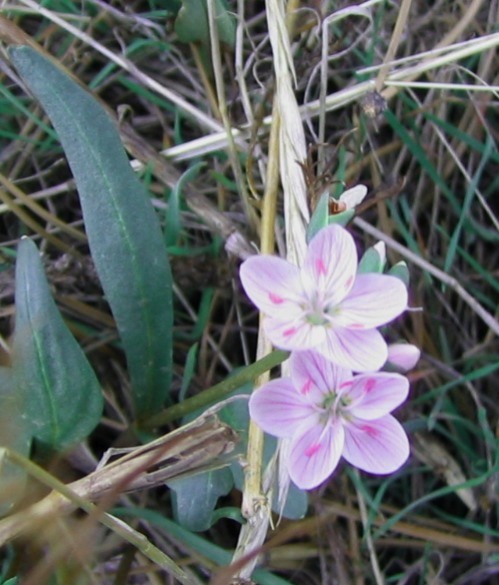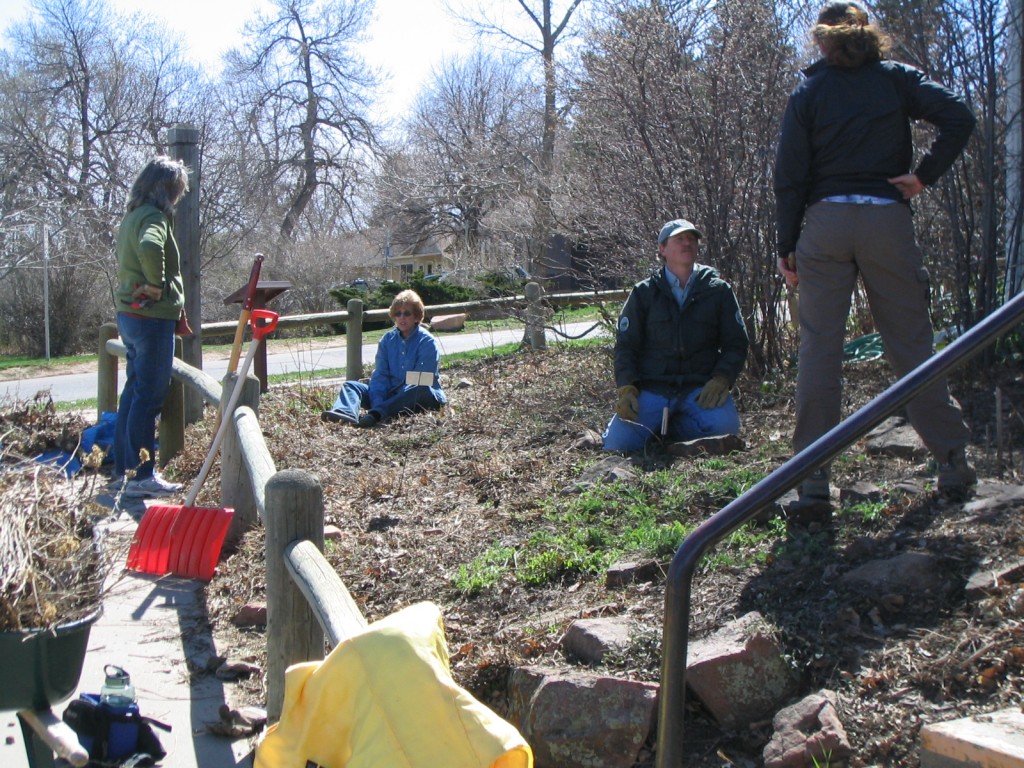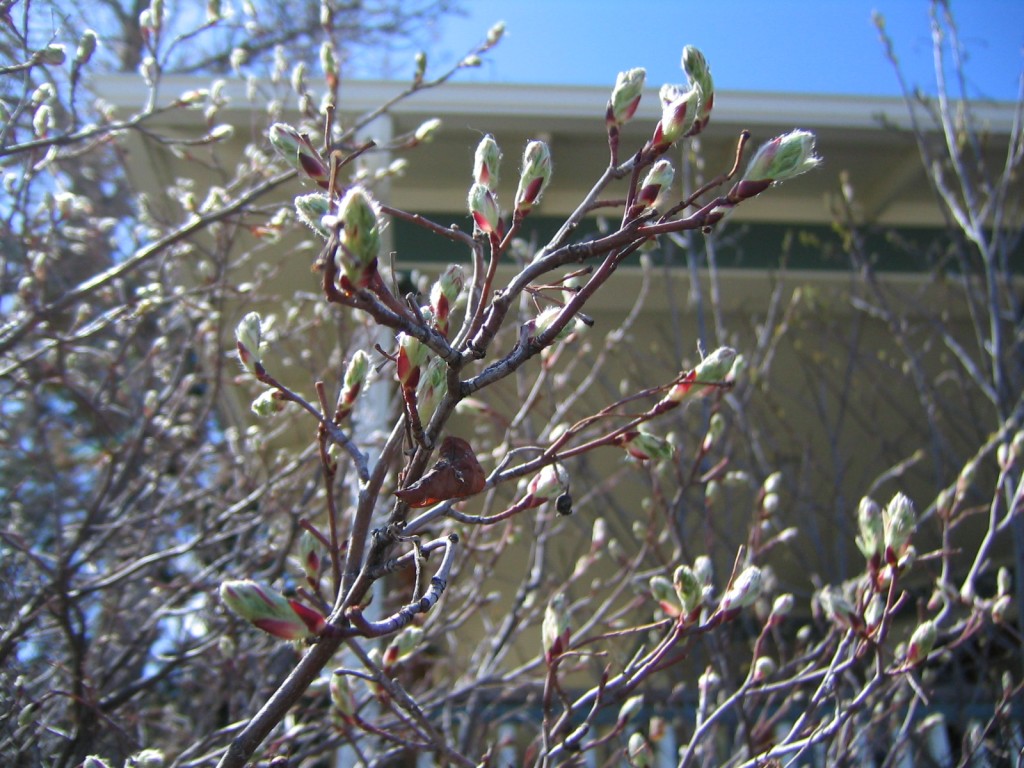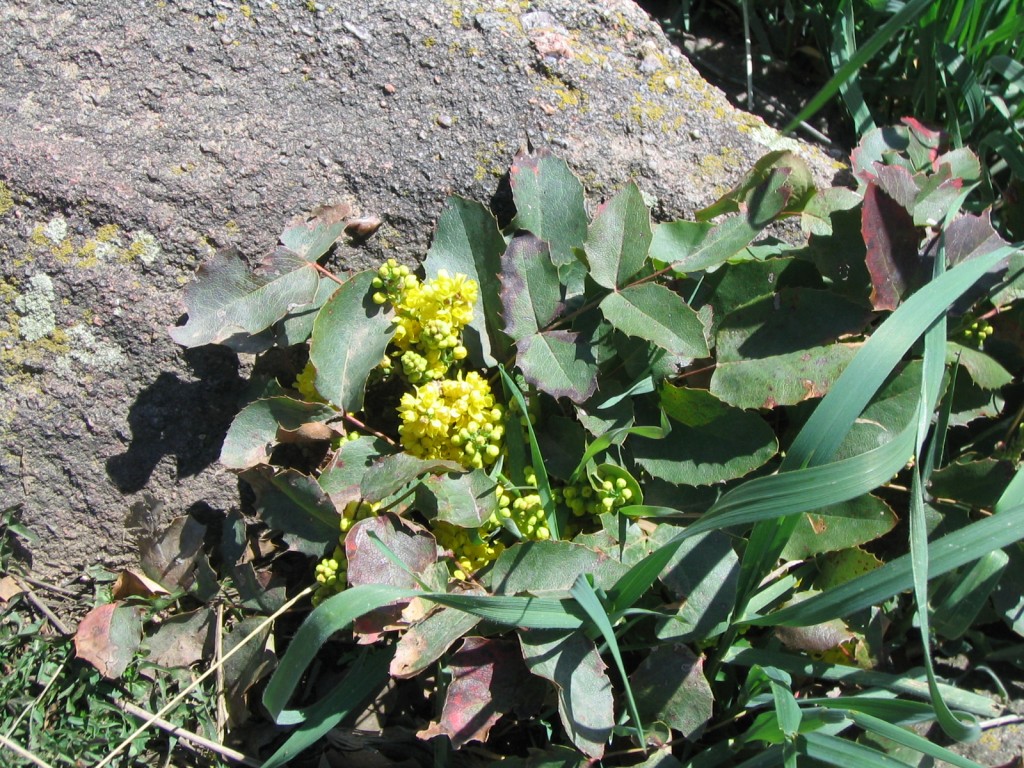Spring is here even in Boulder—at least for today—and now that the trails are mostly dry I am making wildflower rounds again. The McClintock Trail at Chautauqua hosts the earliest blooms, and this morning I scouted for pasqueflowers (no luck) but found their predecessors, the spring beauties (Claytonia rosea):
 White with a pinkish hue, spring beauties sport dark pink lines down the center of each petal, which my wildflower book says “guide insects to nectar, like runways.”
White with a pinkish hue, spring beauties sport dark pink lines down the center of each petal, which my wildflower book says “guide insects to nectar, like runways.”
Such a lovely simile, “like runways.” We immediately hear the buzz of a bee, or an airplane, roaring in a straight line toward its terminus. I was treated to thousands of similes this past weekend at the annual conference of AWP, the Association for Writers & Writing Programs, held here in Denver. For two whole days I played hooky from work to soak in the poetry flowing from lips of many of my favorite writers. (At AWP even prose writers speak in poetry.)
Keynote speaker Michael Chabon offered the highest ratio of similes, an average of about three per sentence. Before I gave up taking notes and sat back to revel in his words, I did manage to snatch this gem:
Ideas are the easiest and least interesting part of the [writing] process; as Madge of Palmolive fame used to say, you are soaking in them. The hard part is sticking with the ideas when they begin to lose their luster—sitting on their heads when they try to roll out from under you.
One of my favorite panels was titled “Writing the Mind’s Wild Geography”—one of several sessions to focus on the connection between language and land.
The earth and all the music of language are one. Language is made from the earth as much as the sparrow or sunflower. —Pattiann Rogers
What a wonderful reminder that everything we produce as humans is not, as we tend to think, removed from earth! Words, music, and even the language of skyscrapers are nourished by the same sunshine and soil, produced from a forest as much as is a butterfly.
It is the music of the language that contains gateways to those experiences sometimes called holy, sometimes called terrifyingly holy. We experience the spiritual in the body. I try to stay close to the physical in language. —Pattiann Rogers
Embodying the connection between words, music, and the physical, Joy Harjo wove jazz and words together in a mesmerizing hour that brought tears to most of our eyes.
When we leave this world, we’re going to take only what we learned by heart. —Joy Harjo
This morning I celebrated language of the heart in yet another way—by attending the first-of-the-season meeting of volunteers at the native plant garden at the Ranger’s Cottage at Chautauqua. We deadheaded last year’s wildflowers, raked, pruned, and chatted in the bright sun and brisk April wind.

As I clipped, I thought about Ann Pancake’s words from the “Mind’s Wild Geography” panel:
Our culture desperately needs new myths, new stories, about the natural world. —Ann Pancake
Pancake wrote a killer of a story for Narrative magazine a few years back exploring what mountaintop removal does to a person, to a family, to a life. The larger story she points to—the story that unites coal mining in the Appalachians with gardening in Boulder—is a story we’ve inherited that devalues the biotic communities that are here, wherever “here” happens to be. It is a story teaching that the land can be used, replaced, or even destroyed without consequence. That what is “here” is not good enough to be preserved.
Meanwhile the serviceberry bush just overhead was near to bursting its fresh leaves:

I want to think that cultivating native plants is one tiny contribution toward changing the story. I want people to know about the birthright of the land—that local landscapes are something to study and learn from rather than replace with water-guzzling turf and exotic flowers. I want to think that changing the story is possible—that we can learn to love “here,” that we will learn to love “here” before it’s too late.
A highlight of AWP was sitting at the front to hear Terry Tempest Williams read on the final night of the conference. Her essay—suffused with birds, of course—told of the stroke she had in September and the uncertainty she now lives with on a daily basis. Even though her brain might erupt and debilitate her at any moment (my brain can too, for that matter, or yours), and fear stalked the essay, her words rang also with celebration:
The birds remember what we have forgotten—that the world is meant to be celebrated. —Terry Tempest Williams
The wildflowers say it too. On the trail in Chautauqua after pruning in the garden, I glimpsed the first blooms of the creeping Oregon grape (Mahonia repens) on a bright hillside next to sun-radiating rock:

Mahonia has the last word here. I think it is joy.
Funny you should mention Chabon–I read Maps and Legends a couple weeks ago, and am now in the process of devouring every other book of his that I can get my hands on. (Will he break my rule of never, ever liking books that won the Pulitzer? Stay tuned…)
I’m embarrassed to say I haven’t read anything of his (yet). I became a fan when I heard him interviewed on Fresh Air and discovered a male writer not afraid to talk about loving his wife and changing his babies’ diapers. He was warm and human. In his keynote he had some acid replies to Katie Roiphe’s dreadful criticism that he was one of the male writers “gelded by feminism.” “Funny how much I enjoy sex!” he said. Then he added that if doing half of the housework and sharing child raising made him gelded, well then, he was gelded. Which of course made most of us women in the audience swoon. I look forward to devouring his fiction.
If you get around to picking up Yiddish Policemen’s Union, let me know what you think of it. I’m testing a theory out.
(Also, perhaps just because it’s the way I got into him, I’d seriously recommend the essays first. Having some vague idea about how his mind works, and what he thought he was writing about with each book has gotten me past the first few chapters of stuff that I might not have gone more than a couple pages into otherwise. And I have been really, really glad to have read everything I have.)